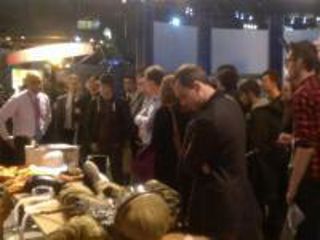
Graduates attend 3rd Annual Space Industry Careers Conference
- 11th Feb 2016
Monday the 8th of February saw the Academy's Graduate Space Industry Careers Conference bring over 100 undergraduates, graduates and postgraduate students together to hear from key voices in the UK space sector. With a programme illustrating the breadth of the sector the event featured speakers involved in such diverse areas as planetary science research on Mars and using satellite data to support agriculture on Earth.
The event, which is the third of its kind after former University of Leicester organisation G-STEP set the event up in 2014, was run solely by the National Space Academy for the first time (G-STEP was wound up in 2015). Although the day was hosted in Leicester at the National Space Centre, delegates came from universities as far away as Aberystwyth and Glasgow.
The keynote talk from Professor Simon Evetts, who until recently led the European Space Agency's Medical Projects & Technology Team at the European Astronaut Centre, included a phone call to Professor Walter Kuehnegger, nicknamed "Professor Moon", whose research led to the development of the now famous "kangaroo hop" used by astronauts moving across the lunar surface. The talk highlighted the importance of multi- or inter-disciplinary working for human spaceflight, and the ways that human spaceflight can benefit life on Earth through medical research.
Other speakers included both business and technical experts, with Reaction Engines' Richard Parker outlining the next step for the design of the SABRE engine, and Deimos' Michael Lawrence encouraging attendees to do their research on the sector to understand the skills employers need. Shorter sessions included "ask a graduate" where attendees had the chance to quiz Airbus Graduate Scheme staff on their current roles and the paths that led them onto one of the most sought after employment schemes in the sector.
Reflecting on the day after the final session, Academy Manager Dr Kierann Shah said "It has been a brilliant day, with some excellent conversations and links being made. One of the most gratifying things is hearing employers reinforcing the messages that we at the Academy have been giving regarding space careers: there ARE jobs out there, technically minded engineering and science graduates ARE needed. We've had Rezatec, Magnaparva and Nottingham Scientific Ltd stand up and say they are recruiting now, and the Open University have even pushed back their deadline for PhD applications so that they could attend this event first and encourage more applications."
When asked about the future of the event, Dr Shah said "There are definitely things about this event that I wouldn't change, things that have worked since its first iteration, like the conference format which is key for young people whose knowledge or experience of the sector may be quite narrow. However I am aware that some things can be improved and we are taking advice from the UK Space Agency, the Satellite Applications Catapult, and space sector companies along with the evaluations from attendees to see what we can do better next time. I really want us to be able to broker vital connections for allowing new talent into the sector, because to me that's a win both for the enthusiastic and passionate graduates and for the sector which needs new talent to enable it to continue to grow."
The National Space Academy will be reviewing the event and associated feedback and will share its findings with exhibitors and contributors, as well as sending follow up information to support attendees once the evaluations are complete.
